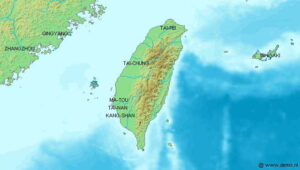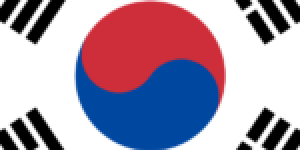Elections In Taiwan: Does The Island Choose Further Confrontation With China?
No Comments yet
Taiwan – Map: Wikimedia Commons
01-07-2024 ~ On January 13, the residents of Taiwan, an island off the coast of China, will go to the polls to elect a new president and parliament. These elections attract more international attention than one might expect for a country with only 24 million inhabitants. The outcome will have consequences for the evolution of the conflict between the United States and China, and consequently, possibly for world peace.
Two weeks before the elections, I spoke with Wu Rong-yuan, the chairman of the Labor Party of Taiwan, in the capital, Taipei. His party is contesting seats in three districts. Due to the first-past-the-post system, this is an uphill battle. Moreover, the Labor Party is marginalized due to its pro-reunification stance with China. To better understand this, I let the veteran of the labor struggle explain the history to me once again.
Taiwan lived under the dictatorship of the Kuomintang, Chiang Kai-shek’s party, until 1987. The roots of the Kuomintang are on the mainland of China, where they were in power until the victory of the socialist revolution in 1949. Even after the end of the dictatorship, the party continued to rule in Taiwan, officially still named the Republic of China, and initiated a process of democratization. Meanwhile, the main opposition coalesced around the Democratic Progressive Party (DPP).
For a long time, the island’s politics were a two-way contest between the Kuomintang and the DPP. Almost all other, much smaller, political forces sided with either the blue or the green coalition, corresponding to the respective colors of the two parties. While the Kuomintang sees the island as part of China, the DPP is unequivocally in favor of an independent Taiwan.
In 2000, the DPP came to power for the first time. After an eight-year hiatus, that happened again in 2016. They not only had the president, Tsai Ing-wen but also governed with a majority in the parliament. It is under Tsai that tensions with China increased further, fueled by the United States.
Wu explained to me that the economic positions of both parties are not significantly different. Both align themselves with the U.S. “Moreover, they also find common ground in anti-communism against the rulers in Beijing,” said Wu, “but while the Kuomintang claims that the residents of Taiwan and the mainland of China form one Chinese nation, separated by the sea and different ideologies, the DPP invented Taiwanese nationalism: Since they came to power 23 years ago, they managed to create a distinct Taiwanese identity out of nothing.”
This does not mean that all Taiwanese support the DPP’s course. On the contrary, the popularity of the ruling DPP has significantly declined. Normally, the opposition would win these upcoming elections hands down. The population is divided over the right stance toward China. The extension of military service from four to 12 months makes the looming military escalation suddenly very concrete. The energy crisis, on the other hand, symbolizes the country’s poor economic performance. The population is far from satisfied with the government’s policies.
A sure win for the Kuomintang, then? Not quite, because this time there is a third party that can convince a significant portion of the voters. The recently established Taiwan People’s Party presents itself as an alternative to the blue and green alliances, putting forward a credible candidate for the presidency, the former mayor of Taipei. It briefly seemed like this party would form a joint presidential ticket with the Kuomintang, but in November, they ultimately chose to run separately.
With a divided opposition, the DPP could still win the elections. The presidential candidates of the DPP and the Kuomintang are neck and neck in the polls. No one can predict who will win. However, the rise of a third party has an important consequence: Regardless of who wins the presidential elections, they will likely not have a majority in the parliament. This means compromises will have to be made.
According to Wu Rong-yuan, these are crucial elections for the relations between Taiwan and China. The Kuomintang advocates the status quo which means that both recognize there is one China but have different interpretations about what this means. The DPP wants to assert Taiwan’s status as an independent country and can count on U.S. support for that. “The confrontational policy of the U.S. makes the status quo impossible,” says Wu, “while the independence the DPP seeks, isolates us from the mainland and goes against the interests of the workers.”
Wu finally explains the vision of the Labor Party: “Reunification between Taiwan and China is the only path to peace and prosperity: ‘One country, two systems’ is a realistic formula.” On the question of whether this would be based on the arrangement with Hong Kong, the answer is negative: “China has clearly stated that Taiwan would have more autonomy, and there are good reasons for that: Hong Kong was a colony of Britain when it was transferred to China, while Taiwan has existed for decades as an autonomous economic and political entity.”
Although there seems to be little openness from the two traditional parties for now, the Labor Party hopes that there will be room for dialogue between Taipei and Beijing after the elections: “There is no model for reunification, and it is only through dialogue and exchange that we can find solutions.”
By Wim De Ceukelaire
Author Bio: This article was produced by Globetrotter.
Wim De Ceukelaire is a health and social justice activist and member of the global steering council of the People’s Health Movement. He is the co-author of the second edition of The Struggle for Health: Medicine and the Politics of Underdevelopment with David Sanders and Barbara Hutton.
Source: Globetrotter
You May Also Like
Comments
Leave a Reply








